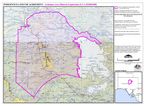 Print this page Print this page | ||
Arabunna Area Minerals Exploration Indigenous Land Use Agreement (ILUA) | ||
| Date: | 13 October 2004 | |
| Sub Category: | Indigenous Land Use Agreement (ILUA) (Native Title Act) | |
| Place: | West of Lake Eyre | |
| Click this link to search this location with google maps | ||
| State/Country: | South Australia, Australia | |
| Click this link to search this location with google maps | ||
| The ILUA covers an area of 34,460 square kilometres. The area is located approximately 250km north-northeast of Woomera, and stretches from Oodnadatta, east to Lake Eyre and south to Anna Creek Pastoral Station. The ILUA falls within the Nulla Wimila Kutju Regional Council and an unincorporated local government area. Further details are available online at the Primary Industries and Resources South Australia website http://www.pir.sa.gov.au/pages/minerals/legislation/ilua/pdf/ilua_arabunna_area_desc.pdf (at 22/03/2005). | ||
| Legal Status: | Registered with the National Native Title Tribunal | |
| Legal Reference: | National Native Title Tribunal File No.: SI2003/00 | |
| Subject Matter: | Cultural Heritage | Employment and Training | Exploration | Future Act | Land Use | Mining and Minerals | Native Title | |
| URL: | http://www.nntt.gov.au/Indigenous-Land-Use-Agreements/Search-Registered-ILUAs/Pages/Arabunna_Area_Minerals_Exploration_ILUA_.aspx | |
| Summary Information: | ||
| The Arabunna Area Minerals Exploration Indigenous Land Use Agreement (ILUA), made between the Arabunna native title claim group, the South Australian Chamber of Mines and Energy and the State of South Australia, provides a framework for negotiations between native title claimants and mineral explorers. The ILUA creates an alternative to the right to negotiate provisions set out Part 9B of the Mining Act 1971 (SA) and in the Native Title Act 1993 (Cth). Explorers will use the contract format agreed by the parties in the ILUA for each exploration tenement they are granted. Because the contract format - like a template - is determined in this ILUA, explorers will not need to negotiate individually on each tenement. The ILUA authorises the grant of exploration tenements and the carrying out of exploration activities in the area that would otherwise have been subject to the future act provisions of the Native Title Act 1993 (Cth). Individual explorers can 'sign up' to the ILUA if they enter into a contract according to the Exploration Contract Conditions. When agreeing to the ILUA, an explorer must choose the exploration tenements to which the contract will apply. The ILUA allows for renewals, grants and extensions of these exploration tenements and the grants of different types of tenements in the notified area, such as mining claims and other miscellaneous licences for exploration. The consent of the parties to future acts is conditional upon compliance with the Exploration Contract Conditions. The ILUA provides guidelines for dealing with any breaches. The ILUA also includes heritage protection processes and commitments to Aborginal employment and training in the area. | ||
| Detailed Information: | ||
| Further details of the ILUA can found at the URL listed above. Some key provisions include: Term The ILUA begins on 13 October 2004. It continues until the date when all accepted exploration contracts have expired or been terminated. Review The ILUA is to be reviewed every five years. The parties may make changes and may agree to continue the ILUA. If this occurs, the ILUA will remain in force for another five years, when it will be reviewed again. Non-extinguishment principle Native title rights and interests continue to exist but have no limiting effect on the grant of exploration tenements or the carrying out of activities under them, as long as those exploration tenements and activities are authorised under the ILUA. Employment and training The parties agree to develop strategies and programs to provide government funded training for Aboriginal people in regional South Australia. Aboriginal Heritage and Culture The Exploration Contract Conditions reiterate the need for explorers to comply with the Aboriginal Heritage Act 1988 (SA). Furthermore, the explorer must try to provide relevant training about Aboriginal culture, native title and relevant legislation to its employees, contractors and subcontractors who carry out activities under the accepted exploration contract. | ||
| ||||
| ||||
|
Was this useful? Click here to fill in the ATNS survey

 Arabunna Area Minerals Exploration Indigenous Land Use Agreement (ILUA) Map - (
Arabunna Area Minerals Exploration Indigenous Land Use Agreement (ILUA) Map - ( 